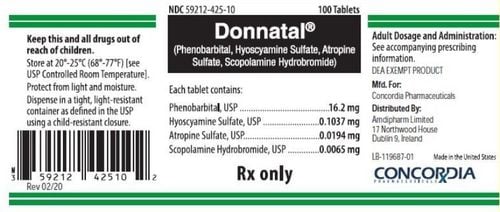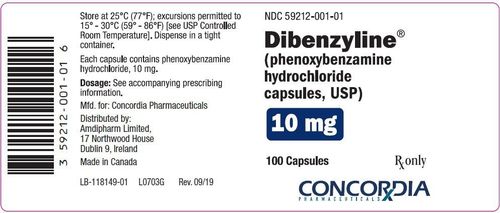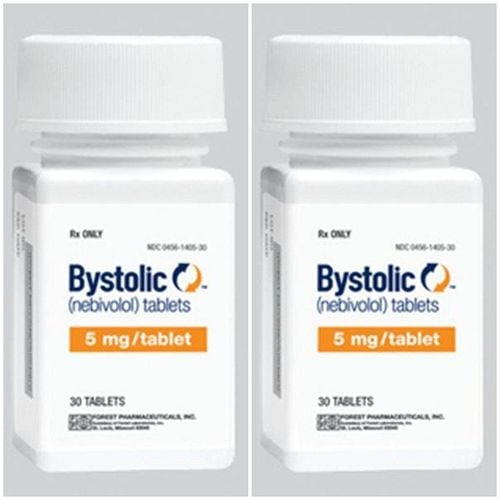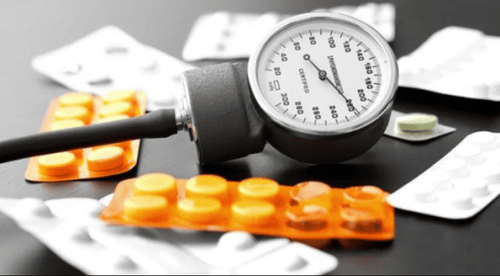This is an automatically translated article.
Nifehexal contains nifedipine, which works by relaxing blood vessels, keeping the heart from working too hard. Nifehexal is used to treat high blood pressure and control angina.
1. Effects of the drug Nifehexal
What is Nifehexal? Nifehexal is a calcium channel blocker with the main ingredient nifedipine used to treat high blood pressure and control angina pectoris. Nifehexal works by relaxing blood vessels, keeping the heart from working too hard, and it also increases blood flow and oxygen to the heart.
In addition, some other effects of the drug are not listed on the approved drug label, but in some cases the doctor may prescribe the use of Nifehexal. Therefore, before taking the medicine, consult your doctor.
2. How to use Nifehexal
Nifehexal 30mg drug is prepared in the form of long-acting film-coated tablets with a strength of 30mg. Dosage will be based on disease status and age such as:
Hypertension: Use a slow-acting and long-acting drug from 10-40mg/time, twice a day or 20-100mg a day. times or 30 - 90mg orally once a day depending on the preparation used. Prevention of angina: Use long-acting and slow-acting drugs from 10-40mg/time, twice a day or from 30-90mg once a day depending on the preparation. Raynaud's syndrome: Take 3 times a day fast-acting capsules from 5 - 20mg. Patients can take the drug with or without food, before or after eating. However, to reduce stomach irritation, you can take it with food and need to swallow the tablet whole with a full glass of water, do not chew or break the tablet.
To use the drug safely, take Nifehexal exactly as directed by your doctor, do not use more, smaller or longer than prescribed. Use Nifehexal regularly to get the most benefit from it and you can stop taking it if any new symptoms appear or the condition does not improve after 7 days. Patients absolutely do not abuse the drug for too long for a long time. This does not make the patient's condition better, but also increases the risk of unwanted effects.
3. Undesirable effects when using Nifehexal
Nifehexal can cause some unwanted side effects, which usually occur in the early stages of taking the drug and will subside after a few weeks or after adjusting the therapeutic dose. Nifehexal tablets are generally less likely to cause side effects than capsules. For short-acting and fast-acting capsules, it can cause excessive hypoglycemia and lead to reflex tachycardia, which can cause myocardial or brain ischemia. Some common side effects can be mentioned as:
Body as a whole: Headache, fatigue, ankle swelling, dizziness, hot flushes. Circulatory: Heart palpitations, palpitations are common and very detrimental, sometimes have to quit, lower blood pressure, aggravate angina. Gastrointestinal: Diarrhea, nausea or constipation. Skin: Urticaria, pruritus, rash. Before prescribing medicine, doctors always consider the benefits and effectiveness of Nifehexal. When using Nifehexal can still occur unwanted effects. Therefore, when unusual symptoms are present, especially when a severe allergic reaction occurs with accompanying signs such as severe dizziness, difficulty breathing, rash, anxiety, dilated pupils, If nausea and vomiting, drowsiness, tachycardia, electrocardiogram changes, the patient should immediately notify the doctor or nurse for immediate medical intervention.
4. Some notes when using Nifehexal
Some notes when using Nifehexal include:
History of allergy to Nifehexal, hypersensitivity reaction to any other allergy. Nifehexal may contain ingredients that don't work and could cause an allergic reaction or other serious problems. Report any medications you are taking including prescription and nonprescription drugs, herbal and dietary supplements, foods, dyes or preservatives. If, after initiation of treatment, ischemic pain occurs or if existing pain rapidly worsens, the drug should be discontinued immediately. Nifehexal should be used with caution in patients with heart failure or impaired left ventricular function because heart failure may be aggravated. For patients with liver damage and diabetes, the dose should be reduced. Avoid using grapefruit juice during treatment with Nifehexal because it can affect drug metabolism. Nifehexal may inhibit labor at delivery. For women who are pregnant, calcium blockers in general and Nifehexal in particular inhibit uterine contractions in the early stages, but there is no solid evidence that Nifehexal slows down the delivery process. . However, the drug Nifehexal causes some complications such as hypoxia to the fetus due to vasodilation or hypotension in the mother, decreased uterine and placental perfusion. Animal studies have shown that nifedipine is toxic to the fetus and may cause teratogenicity, most commonly skeletal deformities. Therefore, it should not be used during pregnancy, unless the potential benefits outweigh the risks.
For women during lactation: Because Nifehexal reaches high concentrations in breast milk, there can be complications for a nursing infant even at normal doses. Therefore, Nifehexal should not be used by women who are breastfeeding or must stop breastfeeding if the mother is being treated with Nifehexal.
If you forget to take a dose of Nifehexal, take it as soon as possible. However, if it is close to the time of your next dose, skip the missed dose and continue taking or injecting the medicine as scheduled. Do not use more drug than the treatment regimen. Nifehexal overdose or ingestion can cause serious symptoms such as nausea, vomiting, abdominal pain, shortness of breath, fainting,...
5. Drug interactions
Drug interactions can decrease the effectiveness of Nifehexal, or increase the effect of unwanted effects. Tell your doctor about all other medicines you are taking including over-the-counter medicines, vitamins, prescription drugs, and herbal products. Do not start, stop or change the dose of any medicine without your doctor's consent.
Some drugs that can interact with Nifehexal include:
Beta-blockers: Although nifedipine is also commonly used in combination with beta-blockers and is generally well tolerated, caution must be taken because it can cause Excessive hypotension, increased angina attacks, arrhythmias and congestive heart failure, especially common in patients with reduced cardiac function. However, the benefits of Nifehexal still outweigh the possible disadvantages. H2-histamine antagonists: Concomitant use of Nifehexal with cimetidine may increase serum concentrations and potentiate the effects of nifedipine. Because dose reduction is required in combination, the mechanism of this interaction is that cimetidine inhibits nifehexal metabolism through inhibition of the cytochrome P450 enzyme. However, with ranitidine, there was only little interaction, while famotidine did not interact with nifedipine. Fentanyl: Severe hypotension occurred during surgery in patients receiving concomitant nifedipine and fentanyl. Drug manufacturers recommend that, if high doses of fentanyl are used during surgery, nifedipine should be withheld at least 36 hours before surgery, if the patient's condition allows. Antiepileptic Drugs: Concomitant administration of Nifehexal with antiepileptic drugs such as phenytoin will increase the plasma concentration of phenytoin and thereby the effects and toxicity of phenytoin (such as headache, nystagmus, tremor, confusion). dysarthria, depression,...) all increased. Theophylline: Nifehexal reduces the plasma concentration of theophylline. Co-administration of nifedipine with theophylline alters asthma control. Quinidine: Nifehexal may significantly reduce the serum concentration of quinidine in some patients but has no effect in others. Digoxin: Nifehexal increases the serum concentration of digoxin by about 15 - 45% when administered concomitantly. Therefore, it is important to monitor for signs of digoxin toxicity and reduce the dose if necessary. Alpha blockers: Alpha blockers, especially prazosin, may potentiate the hypotensive effect because Nifehexal inhibits the metabolism of prazosin, so caution should be exercised. Other calcium blockers: Plasma concentrations of both nifedipine and diltiazem are increased when these two drugs are co-administered. This may be because both drugs are metabolized by the same liver enzymes, reducing the metabolism of each drug. Antiplatelet agents: The antiplatelet effect is increased if nifedipine is combined with aspirin or ticlodipine. Immunosuppressants: Cyclosporin reduces the metabolism of Nifehexal through competitive inhibition of the cytochrome P450 metabolic enzyme. Rifampicin: Rifampicin induces cytochrome P450 enzymes in the liver, reduces nifedipine plasma concentrations and increases angina attacks. Non-Steroidal Anti-Inflammatory Drugs: Indomethacin and other non-steroidal anti-inflammatory drugs may antagonize the antihypertensive effects of calcium blockers by inhibiting renal prostaglandin synthesis, or by causing salt and water retention.
6. How to store Nifehexal
Store Nifehexal at room temperature below 30 degrees Celsius, protect from light and avoid humid places. Do not store Nifehexal in a humid place or in the freezer and keep away from heat and open flames. Different medicines will have different storage methods, so read the Nifehexal storage instructions carefully on the packaging, or ask your pharmacist. Keep Nifehexal out of the reach of children and family pets. When the medicine has expired or is damaged and cannot be used anymore, dispose of it and dispose of it properly. Do not dispose of Nifehexal in an environment such as a water pipe or toilet unless requested to do so. Please consult your waste disposal company or pharmacist on how to safely dispose of Nifehexal to help protect the environment. In a nutshell, Nifehexal, whose main ingredient is nifedipine, works by relaxing blood vessels, keeping the heart from working too hard. Nifehexal is used to treat high blood pressure and control angina. However, Nifehexal can cause some unwanted effects and drug interactions, so tell your doctor what medicines you are taking to reduce the risk of unwanted effects and increase the risk of side effects. effective for treatment.
Follow Vinmec International General Hospital website to get more health, nutrition and beauty information to protect the health of yourself and your loved ones in your family.
Please dial HOTLINE for more information or register for an appointment HERE. Download MyVinmec app to make appointments faster and to manage your bookings easily.













